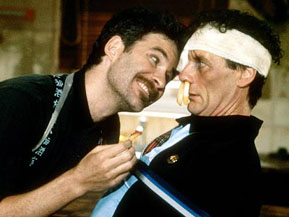A-List: Best Oscar Losers
By Josh Spiegel
October 8, 2009
How can you turn down a man who can not only pull off English, American, and German accents with aplomb, but can say the following line without laughing: "Gentlemen, you can't fight in here, this is the war room!" What's even more fascinating is that Sellers was originally meant to play a fourth character: the gung-ho soldier played by Slim Pickens in the final product, directed by the late Stanley Kubrick. Sellers apparently had doubts about his Southern accent, though I'm sure his chameleon-like qualities would have served him quite well as the goofy yahoo who rides the bomb to glory. How Sellers didn't walk away with an Oscar for the film (or for any of his work) is beyond me, and is one of the great misses in Oscar history.
The Third Man
When it comes to film noir, one of the best ever (if not the best of them all) is The Third Man, a twisty picture if there ever was one. Directed by Carol Reed, the film tells the story of Holly Martins, a pulp novelist who comes to Vienna to meet an old friend and ends up trying to solve his murder. Holly falls in love with his friend's girlfriend, who still holds out hope and memories for her lost lover. Or is Holly's friend, Harry Lime, dead at all? Who is the third man who was seen at Harry's death scene? And what the hell is all that zither music? Seriously, one of the great pleasures of The Third Man is Reed's direction, filled with slanted camerawork, bleak lighting, fast-paced chases, and a constantly shifty tone. When it came to Oscar time, Reed came up short, losing out to Joseph L. Mankiewicz for All About Eve.
There's no question that All About Eve is a great film, a slick, snappy, sharp comedy-drama about the trials and tribulations of actresses young and old. However, it cannot hold a candle to the auteurish vision that Reed had for this cynical downer of a movie. In future years, the Academy would make up its slight to Reed, awarding him the Oscar for Best Director...for Oliver! No offense meant, but it's not only a huge stylistic jump from The Third Man to Oliver!, but you get the feeling that the award was more of an apology for past transgressions than an honor for the actual movie. Of course, the idea that the same man who ended The Third Man so unhappily could also give us a cheerful retelling of Dickens' classic is perhaps worthy enough of an award.
The Godfather, Part III
Now, before you get out the pitchforks and torches, let me explain. By no means am I saying that, among the trilogy, The Godfather, Part III is great. However, what the film does have, and what the entire trilogy has, is Gordon Willis as its cinematographer. Moreover, since Willis, perhaps one of the best and underrated cinematographers of the past 50 years, only received two Academy Award nominations in his entire career (and not even for the films that deserved it), I feel it necessary to single him out. Willis lost this time around, as he did for his other Oscar nod (1983's Zelig), this time to Dean Semler and Dances with Wolves. What made Willis stand apart from his colleagues was his use of light and shadow, with a heavy emphasis on the latter. If you remember the inherent darkness from the first two Godfather films, you have Willis to thank.
Also, what of the lush black-and-white cinematography of 1979's Woody Allen classic Manhattan? Willis there, too. Cinematography, in my opinion, is one of the parts of filmmaking that should get nearly as much hoopla as acting or directing, because of its truly critical importance, and the experimentation that can be done by those working the cameras. Willis was unlike some other cinematographers, choosing to play down color, letting darkness take its toll. Though he did get an honorary Oscar last year, Willis didn't win or get nominated for the work he should have; Brando and Coppola make The Godfather classic, but so too does Willis. If you're not familiar with his work, check it out.
Continued:
1
2
3
|
|
|
|




